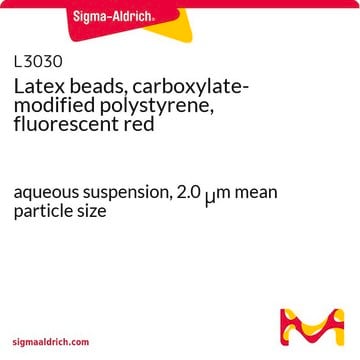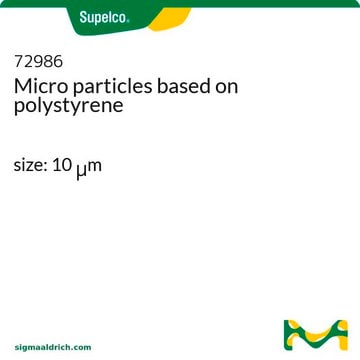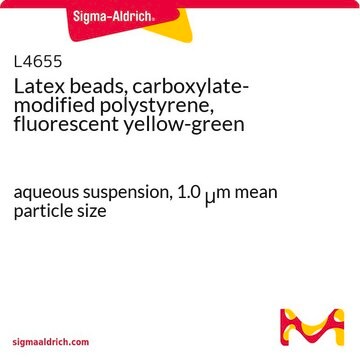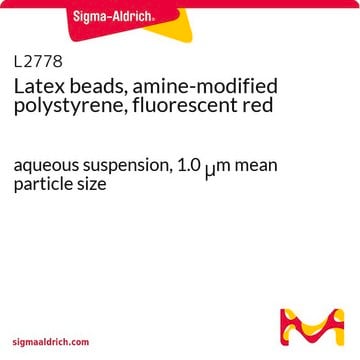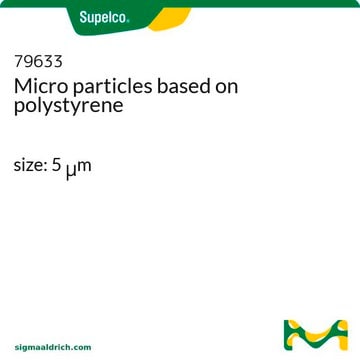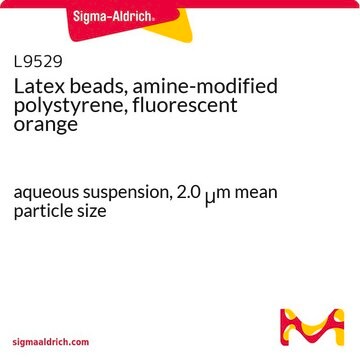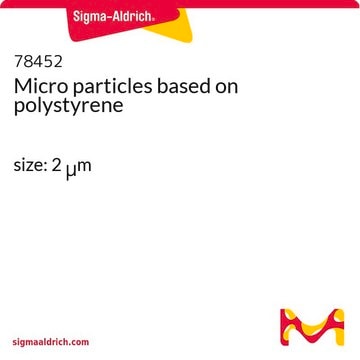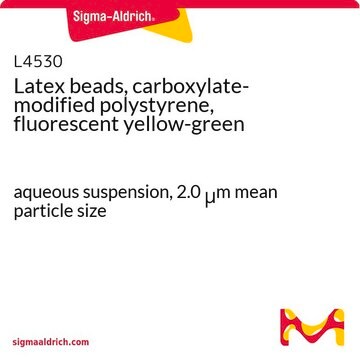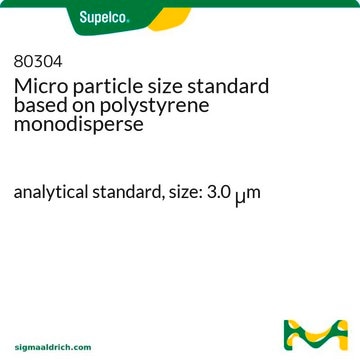LB30
Latex beads, polystyrene
3.0 μm mean particle size
Sinónimos:
Latex Beads, Latex Microspheres
Iniciar sesiónpara Ver la Fijación de precios por contrato y de la organización
About This Item
Productos recomendados
form
aqueous suspension
composition
Solids, 10%
packaging
pack of 1 mL
pack of 15 mL
pack of 2 mL
mean particle size
3.0 μm
¿Está buscando productos similares? Visita Guía de comparación de productos
General description
Latex beads are utilized in applications including electron microscopy and cell counter calibration, antibody-mediated agglutination diagnostics, phagocytosis experiments, and many others. The most popular use of latex beads is, particularly in latex agglutination tests. This method allows the detection of minute amounts of antigens or antibodies in serum, urine, and cerebrospinal fluids. It is also used in phagocytosis research. The beads are supplied as aqueous suspensions and are composed mainly of polymer particles (30%) and water, (>69.0%) with small amounts of surfactant, (0.1–0.5%) sodium bicarbonate, and potassium sulfate (inorganic salts – 0.2%). This product is for R&D use only, not for drug, household, or other uses. For more information, please refer the Product Information Sheet.
Storage Class
12 - Non Combustible Liquids
wgk_germany
WGK 3
flash_point_f
Not applicable
flash_point_c
Not applicable
Certificados de análisis (COA)
Busque Certificados de análisis (COA) introduciendo el número de lote del producto. Los números de lote se encuentran en la etiqueta del producto después de las palabras «Lot» o «Batch»
¿Ya tiene este producto?
Encuentre la documentación para los productos que ha comprado recientemente en la Biblioteca de documentos.
Los clientes también vieron
Yang Zhang et al.
Journal of nanobiotechnology, 18(1), 69-69 (2020-05-08)
Cell-bound membrane vesicles (CBMVs) are a type of membrane vesicles different from the well-known extracellular vesicles (EVs). In recent years, the applications of EVs as drug delivery systems have been studied widely. A question may arise whether isolated CBMVs also
Agustín Mangiarotti et al.
Langmuir : the ACS journal of surfaces and colloids, 35(30), 9848-9857 (2019-07-04)
Hopanoids are pentacyclic molecules present in membranes from some bacteria, recently proposed as sterol surrogates in these organisms. Diplopterol is an abundant hopanoid that, similar to sterols, does not self-aggregate in lamellar structures when pure, but forms monolayers at the
Ming Gao et al.
Transfusion, 58(10), 2388-2394 (2018-09-12)
Although platelet microparticles (PMPs) were the most abundant micoparticles (MPs) in platelet (PLT) products, other MPs and their parental cells can also be brought into the plasma during PLT apheresis. However, the effects of PLT apheresis, storage time, and leukofiltration
Mona Seifert et al.
Nucleic acids research, 48(10), 5591-5602 (2020-04-15)
RNA virus survival depends on efficient viral genome replication, which is performed by the viral RNA dependent RNA polymerase (RdRp). The recent development of high throughput magnetic tweezers has enabled the simultaneous observation of dozens of viral RdRp elongation traces
Silène T Wavre-Shapton et al.
Human molecular genetics, 24(24), 7060-7074 (2015-10-10)
Retinal degeneration and visual impairment are the first signs of juvenile neuronal ceroid lipofuscinosis caused by CLN3 mutations, followed by inevitable progression to blindness. We investigated retinal degeneration in Cln3(Δex1-6) null mice, revealing classic 'fingerprint' lysosomal storage in the retinal
Nuestro equipo de científicos tiene experiencia en todas las áreas de investigación: Ciencias de la vida, Ciencia de los materiales, Síntesis química, Cromatografía, Analítica y muchas otras.
Póngase en contacto con el Servicio técnico
